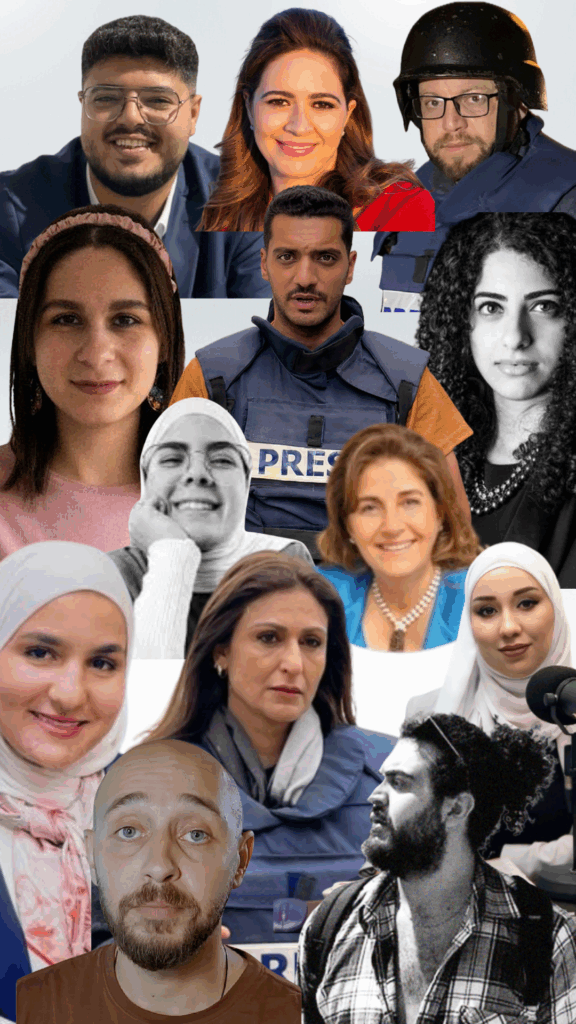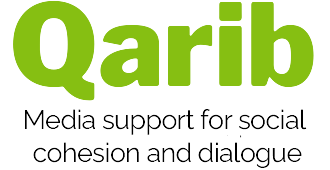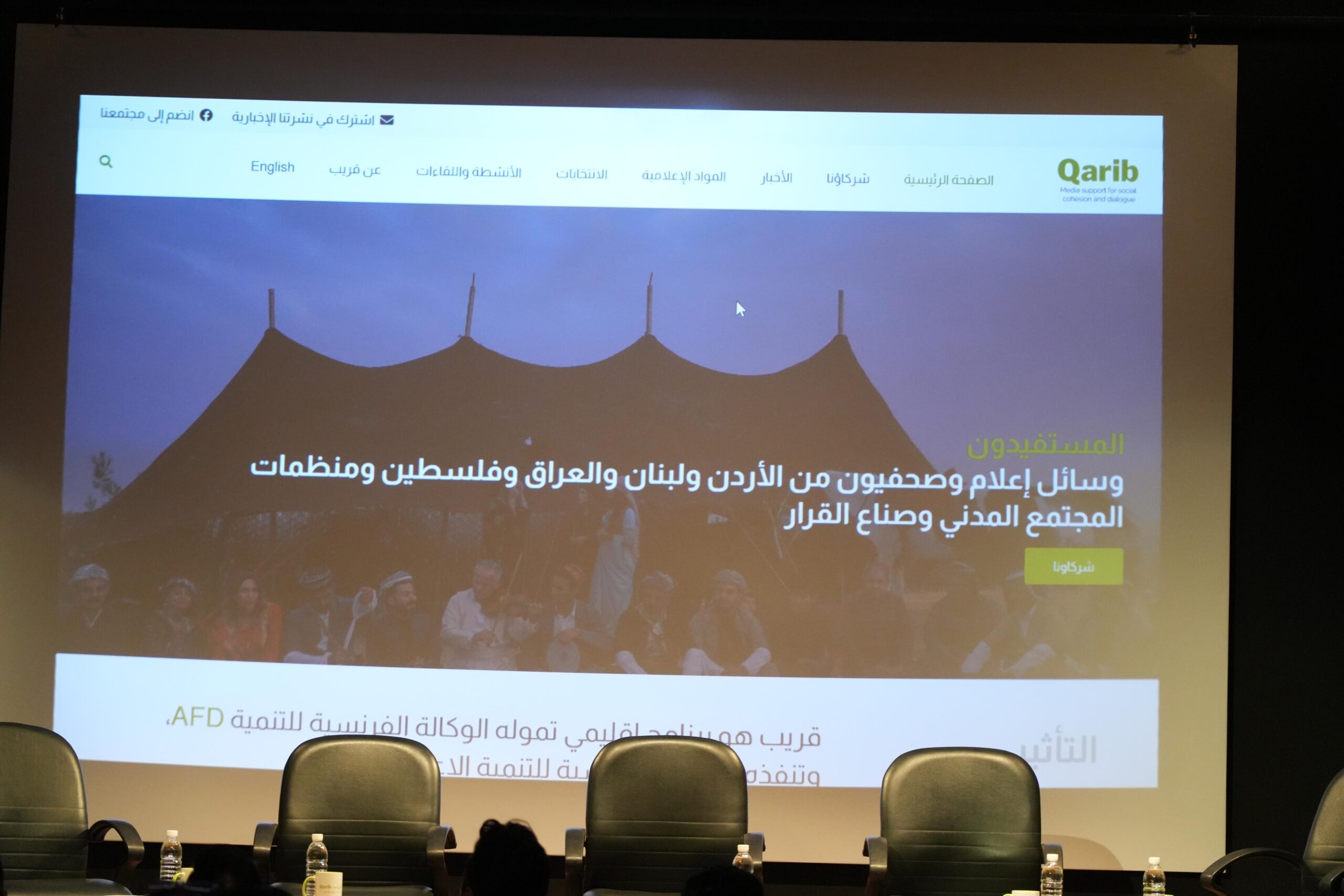Our Colleagues in Gaza Face New Displacement – Qarib Launches “Artificial Intelligence for Media”
Our colleagues have once again been displaced inside Gaza, as the war expands into the city. Partners at Akhir Qissa moved south in what is now their third displacement since the war began, with some losing their homes. Despite this suffering, they have continued to report on the atrocities endured by Gaza’s residents.
In its latest report, the outlet describes not only the pain of killings, hunger, and displacement itself, but also the hardships of rent, tents, and finding new shelters to accommodate the newly displaced — stories that rarely make their way into mainstream media amid the ongoing devastation.
Qarib – Artificial Intelligence for Media (Q-AIM)

Qarib has launched a new project on artificial intelligence in partnership with one of the world’s leading media institutions.
This initiative stems from an assessment we carried out with our partners in Palestine, Lebanon, Iraq, and Jordan during our annual regional meeting held in Amman last January. The goal was to understand where our partners stand regarding the use of AI in media.
Findings showed that only a small number of organizations have begun experimenting with AI in content production and analysis, while most remain in the early stages. The majority of institutions also lack clear policies on AI.
Based on these results, Qarib launched Q-AIM in partnership with Financial Times Strategies (FT Strategies), the consultancy arm of the Financial Times.
The program consists of two phases. The first phase focuses on analyzing opportunities and challenges, including training on AI usage. The second phase, which runs for nine months, aims to develop forward-looking strategies and visions for platforms with the support of FT Strategies experts. During this stage, several partners will receive tailored guidance to design practical roadmaps for applying AI in their media organizations.
International Youth Day and Qarib’s Campaign

In August, Qarib marked International Youth Day with an interactive campaign centered on the voices of young people working in media.
Over two weeks, we produced 13 videos blending heartfelt personal stories, youthful reflections, and professional advice from experienced journalists. These pieces highlighted the challenges and hopes of a new generation of media professionals across the region.
The results were remarkable: over six million views, hundreds of interactions, and a wave of new followers who found in these stories echoes of their own experiences and questions. What stood out was not only the numbers but also the authentic voices that emerged, reflecting the realities of young journalists from Jordan, Lebanon, Iraq, and Palestine. The campaign offered them a space to feel seen, heard, and supported.
This was Qarib’s most successful campaign to date, reaffirming our mission: to amplify voices that might otherwise remain on the margins, and to underline media’s role as a tool for change and a source of hope.
Among the top-performing videos was a moving and inspiring message from Ghazi Alaloul, a journalist with Roya Palestine. Speaking from Gaza, he chose to share practical advice for aspiring journalists, affirming that the determination and voices of youth can overcome even the toughest obstacles.
You can watch the full video on Instagram and explore the full campaign on our YouTube channel.
Qarib Hosts Climate Change Debate in Iraq

On August 30, the French Institute in Baghdad hosted a pivotal panel discussion on climate change in Iraq: its challenges and opportunities.
Organized by Qarib in partnership with Yalla Media, the event brought together a distinguished group of experts: Dr. Rana Sadiq, PhD in Agricultural Extension; Mr. Omar Abdul Latif of the Iraq Green Observatory; Dr. Najla Al-Waeli, General Director at the Ministry of Environment; and Dr. Ali Jawad Al-Musafri, head of Gilgamesh Center for Archaeology and Marshlands.
Moderated by journalist Mohammed Al-Basim, the discussion emphasized the critical role of government, media, and public engagement in addressing Iraq’s pressing environmental challenges.
Speakers highlighted Iraq’s fragile situation under climate change. Once the cradle of civilization, the country now faces severe threats from rising temperatures, shrinking rivers, and worsening air pollution.
They stressed that these challenges are not distant threats but everyday realities: reports show nearly nine out of ten Iraqis are affected by extreme heat, air pollution, and water scarcity. Through Qarib, CFI reaffirmed its commitment to empowering Iraqi media to cover climate change — not as an abstract issue, but as a tangible reality.
Productions from Our Partners
-
Partner outlet Khat 30 published an investigation into children forgotten in Israeli prisons.
-
Youth-led Shamaa TV, supported by Qarib, continued to produce content addressing young audiences and their concerns.
One example is Fadi, a media graduate who, amid unemployment and scarce opportunities, chose an unconventional path: fish farming. His story reflects an inspiring model for Palestinian youth searching for realistic alternatives to build their futures beyond academic degrees and labor market pressures.
In Lebanon, Silet Wasel joined Qarib’s partner network this month, beginning with a series of productions including an investigation into the psychological impact of the recent war on youth and mothers in South Lebanon — an issue largely ignored by official bodies.
Stay tuned for Qarib’s September magazine, where we will share more on our AI initiative and its sessions, along with further partner productions. September will also witness two significant partner events in Lebanon:
-
L’Orient-Le Jour, Lebanon’s only French-language daily newspaper, will celebrate its centenary with a full program of discussions on the role of media and the future of the region.
-
Qarib partner Nuqta will host a major gathering of women content creators from across the Arab world, including debates, workshops, and diverse activities.
Qarib is a regional program funded by the French Development Agency (AFD) and implemented by the French Media Development Agency (CFIMEDIAS).

